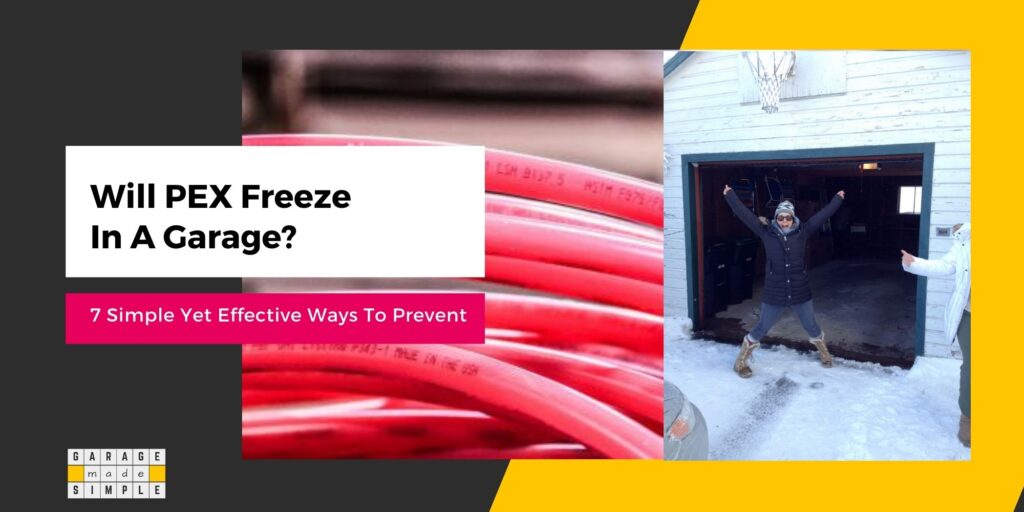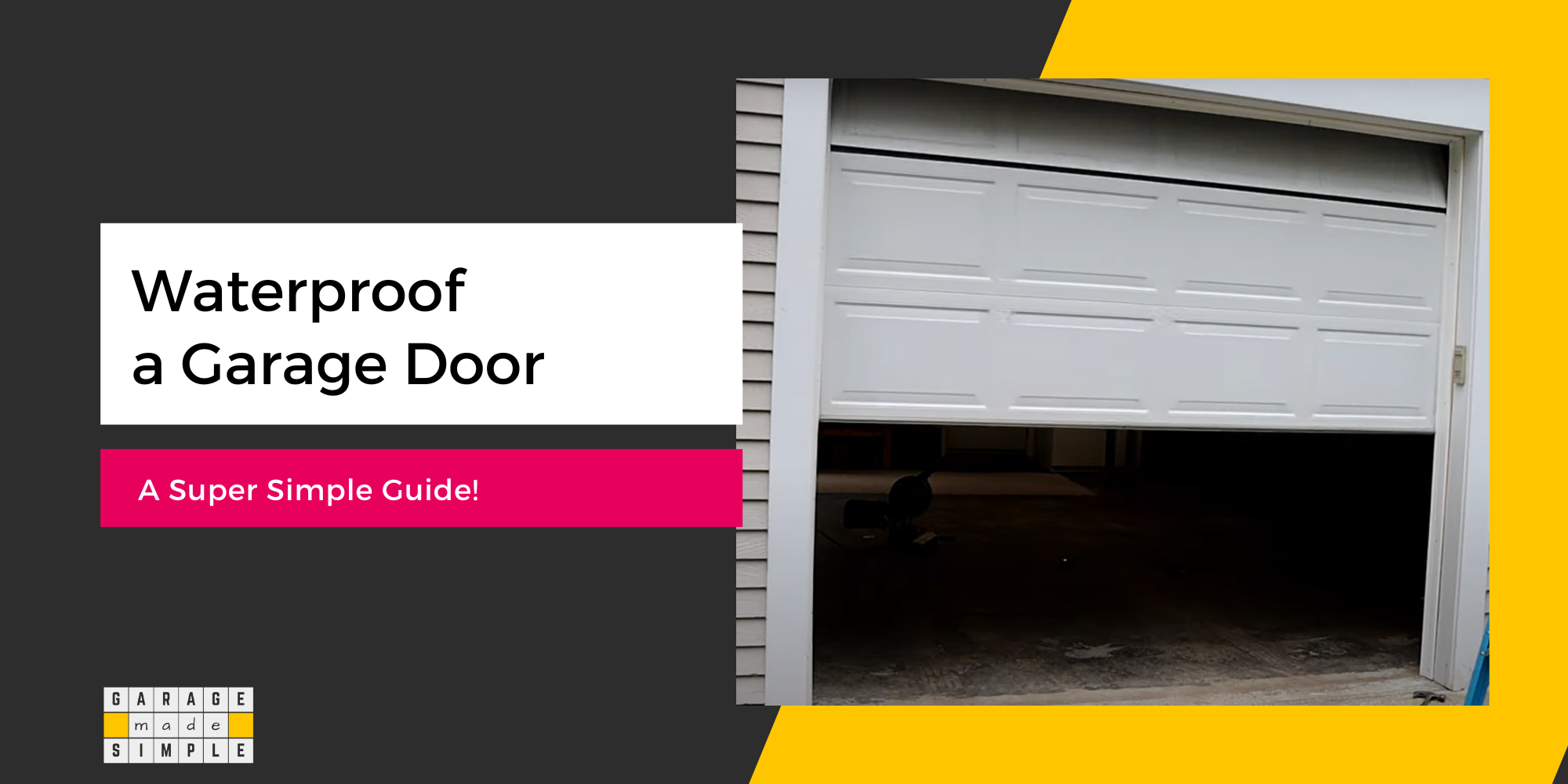Will PEX Freeze in a Garage? (7 Simple Yet Effective Ways To Prevent!)
Will PEX Freeze in a Garage?
Quite often a garage is not insulated and not heated. The temperature within such a garage is not much higher than the temperature outside during winter. It of course gets a lot colder during the night. If you have plumbing in the garage, will it freeze? What about PEX? Will PEX freeze in a garage?
Water inside any pipe will freeze if the water temperature drops and stays below 32 degrees Fahrenheit. However, a PEX pipe is less likely to burst as it is flexible. PEX pipe will expand when the water within freezes and expands.
You should keep in mind that a PEX pipe is freeze resistant, but it is not freeze proof. Even a PEX pipe in a garage will freeze and burst if you are going through a particularly rough winter.
A PEX pipe is less likely to freeze in an unheated, uninsulated garage, but it can freeze. Take the same precautions, to prevent freezing, as you would with other materials such as copper or CPVC.

At What Temperature Will PEX Pipe Freeze?
It is the water in the pipe that freezes, not the pipe itself. As we all know, the freezing point of water is 32 degrees Fahrenheit. However, for the water to freeze, the water has to be still and at 32 degrees Fahrenheit or lower for some period of time.
Even if the ambient temperature is somewhat below freezing, the water in the pipe will not freeze. Especially if it is flowing!
Typically, underground water pipes or pipes running through unheated, uninsulated space such as a garage will start freezing when the outside temperature drops to around 20 degrees Fahrenheit.
This is more of an observation than a scientific rule. The figure can vary from one geographical zone to another and is also a function of the pipe material and insulation around it.
NOTE: PEX is a better insulator than copper and GI (galvanized iron).
PEX-a offers up to 30 percent better insulating value when comparing uninsulated PEX-a with uninsulated copper pipe.
Plumber Magazine
Will PEX Pipe Burst When Frozen?
Compared to other piping materials such as copper and CPVC, a PEX pipe is less likely to burst when frozen. PEX is quite flexible. PEX pipe will expand when the water inside freezes and will contract to its original size once thawed.
PEX — an acronym for cross-linked polyethylene — has gained a lot of popularity in the pipes, valves and fittings (PVF) market. It has overtaken materials such as copper and CPVC.
Due to its flexibility and expansion characteristics, PEX pipe is much more freeze resistant when compared with copper and CPVC. Because of its thermal and shape memory, PEX-a can expand up to three times its extruded diameter. As a result, if water freezes in the pipe, the pipe can flex to accommodate the expansion and then shrink back down after the ice thaws.
Plumber Magazine
How Do You Keep PEX from Freezing in Your Garage?
Though a PEX pipe is less likely to burst from freezing, repeated cycles of freeze and thaw weakens it. It is best to prevent PEX from freezing in your garage, as far as possible.
Here are 7 simple yet effective ways to keep PEX from freezing in your garage:
#1 – Insulate the Garage Walls
Insulating your attached garage may seem like an additional cost, but it pays off in the long run in energy savings. You need less energy to keep your home at a comfortable temperature as you lose less heat through an insulated attached garage.
You can even insulate a finished garage, without taking down the drywall by using Injection Foam Insulation. Three holes are drilled into the drywall at each stud cavity. One each at the bottom, middle and top of the drywall wall.
The Injection Foam Insulation is pumped first through the bottom hole, then the middle hole and finally the top hole. The holes can be plugged later. The process is simple and the least messy option. You do need to get a professional to do it, though.
#2 – Garage Door Insulation & Weatherstripping
Maximum amount of heat is lost through the garage door. Garage doors are often made from steel, aluminum, fiberglass and glass. None of these have good insulation properties.
Garage doors can be insulated using either Expanded Polystyrene (EPS) panels or Fiberglass rolls or batts.
You could buy a garage door insulation kit from a reputed manufacturer, such as Matador. The kit has 8 High Impact Polystyrene Laminate Panels (23. 25″ H x 54″ W x 1.25″ thick). These are designed for use on standard 8-foot and 9-foot non-insulated sectional garage doors.
The other option is to buy a fiberglass garage door insulation kit from a reputed manufacturer, such as Owen Corning. The kit has 8 insulating panels (22″ H x 54″ W x 2.25″ thick). Each kit provides enough material to insulate a single car garage door up to 9-Feet wide.
Do not forget to check the weatherstripping on your garage door before the onset of winter. Replace garage door seals if they have cracked or are brittle. Seals that are not airtight will let in the outside cold air.
#3 – Keep Door & Vents Closed
A lot of cold air enters your garage every time you open the garage door. The garage door is the biggest opening in your house. During winters, it is a good idea to park your cars in the garage early, close the garage door and let it remain closed till the morning.
Having vents in your garage is a great way to ensure good circulation. However, during really cold spells you may want to keep them closed, especially during the night. Preventing the PEX pipes in your garage from freezing is more important than air circulation.
#4 – Keep the Garage Heated
Insulation will get you to a point, but you may still need to consider heating it. Of course you can not connect your home HVAC to the garage. It is against the code. But you can install stand alone heaters.
Heating the garage will actually help keep your home warmer. A cold garage sucks the heat from your warm house and makes the adjoining rooms cooler. There are many types of garage heaters. Some run on electricity while others run on propane.
If you are looking to get an electric garage heater, the 5000W Fahrenheat FUH Electric Heater for Garage works well for a standard 1 car garage. A bigger garage will need a higher wattage heater.
If you choose to use a propane heater make sure that it comes with a built-in vent. I recommend Ashley Hearth DVAG11L 11,000 BTU Direct Vent Propane Heater.
You could even heat your garage for free. Just invest in solar panels on your garage roof!
#5 – Insulate the PEX Pipe
In case you do not want to spend too much money on insulating or heating the garage, at least insulate the PEX pipes. It will certainly help and the PEX pipes may not freeze in the garage during winter.
You can order Frost King Self-Sealing Pre-Slit Tubular Polyethylene Foam Pipe Insulation, from Amazon and do the insulation work yourself. It is rather simple and does not cost much.
#6 – Keep the Water Moving
This is a rather simple hack and does not cost anything (except a bit of water). Keep a faucet dripping when the outside temperature is forecast to dip below 20 degrees Fahrenheit.
Moving water does not freeze as easily as still water. You might have noticed that streams are still bubbling along while the nearby lake is frozen.
#7 – Drain out the Water
Are you expecting a long cold winter spell where the outside temperature will be below 20 degrees Fahrenheit for several weeks? Maybe, it is better and safer to drain the PEX pipe of water altogether. No water, no freezing.
Shut off the inlet valve and let the water run out! The PEX pipe will not freeze in your garage.
Thank you very much for reading the post. I do hope you found it informative and useful.






